City prioritizes efforts to help elderly during pandemic as vaccination drive proves effective
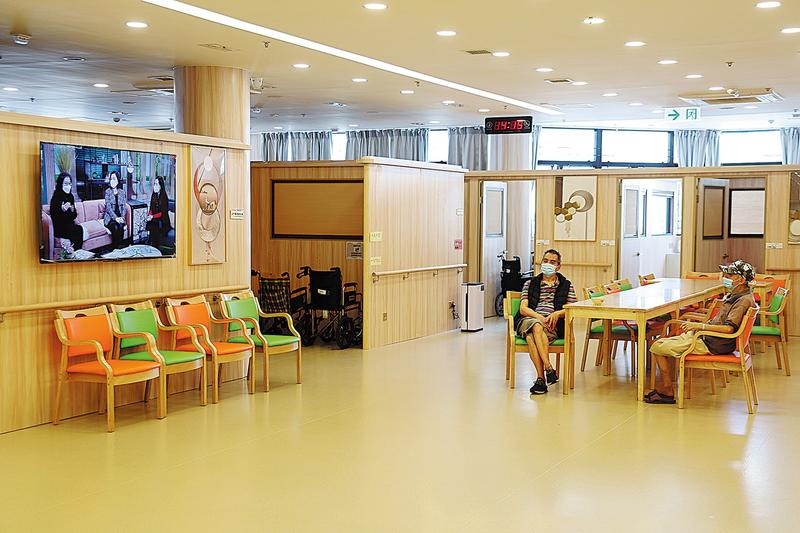 Residents watch television in the lobby at Pleasure Lodge. (EDMOND TANG / CHINA DAILY)
Residents watch television in the lobby at Pleasure Lodge. (EDMOND TANG / CHINA DAILY)
Last month in Hong Kong, staff members from Pleasure Lodge, a newly opened residential care home for seniors in Kwai Chung, New Territories, set off in a rehabilitation bus to pick up elderly residents from a nursing home in Tai Wai, about a 30-minute drive away.
When they reached their destination, electric elevators for wheelchair users were lowered from the vehicle.
The staff members were met by five senior residents in wheelchairs and two more who were standing. All seven had tested negative for COVID-19.
The elderly benefit from being placed in safe accommodations with a professional care service.
Leo Fong Fu-leung, CEO of Pleasure Lodge
Dressed in pale yellow protective gowns and wearing face masks and protective shields, the seniors were taken to Pleasure Lodge for a two-week stay until the situation at their coronavirus-affected care homes improves.
The rehab bus had to make two trips to transport the seniors, as it can only accommodate a maximum of four wheelchairs at a time.
The seniors were the first group of nursing home residents in the city to be placed in another such home reserved solely for healthy elder residents. Pleasure Lodge is one of two homes in Hong Kong providing this service, which has been termed "quarantine in reverse" by Chief Executive Carrie Lam Cheng Yuet-ngor. The two homes provide a total of some 200 beds.
When the city was hit by its worst wave of COVID-19 to date, the two nursing homes featured among a number of measures announced by Lam to help the hard-hit elderly care sector.
Pleasure Lodge provides 114 rooms for elderly residents referred to the home by the Hong Kong government's Social Welfare Department. The bill for their care is footed by the local administration.
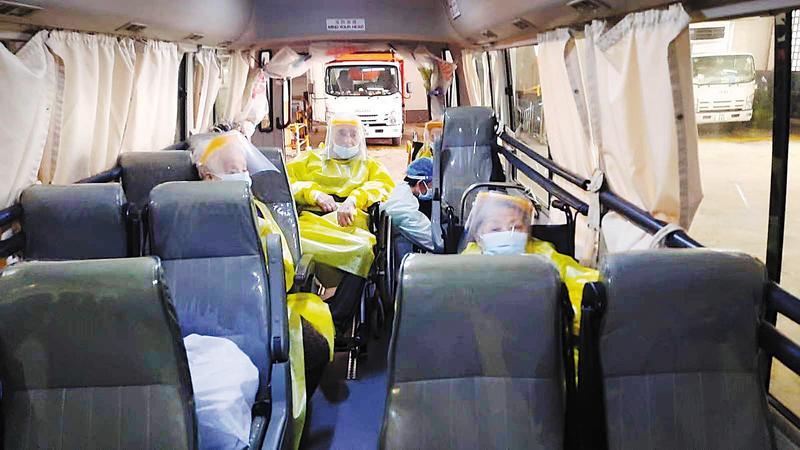 Seniors take a rehab bus to Pleasure Lodge. (PHOTO PROVIDED TO CHINA DAILY)
Seniors take a rehab bus to Pleasure Lodge. (PHOTO PROVIDED TO CHINA DAILY)
Before moving into Pleasure Lodge, the seniors underwent further rapid antigen tests and could only enter their temporary home if they tested negative.
Leo Fong Fu-leung, CEO of Pleasure Lodge, said, "In some cases, the seniors tested positive and had to be taken back."
Seniors who began to show COVID-19 symptoms after two to three days were transferred to the Asia-World-Expo community treatment facility, reserved mainly for those with mild symptoms and elderly patients in stable condition.
Daily rapid antigen tests are required for those who check into Pleasure Lodge. After testing negative for three consecutive days, they are allowed to move freely around the home and to watch television in the lobby, a privilege denied to their peers in other nursing homes where the pandemic is raging.
Pleasure Lodge residents have meals in their room, where they are also given physical rehab treatment. They take turns to use the shower, in order to reduce contact and prevent the risk of infection. Each room is equipped with a TV, while robotic devices allow the seniors to hold video chats with family members.
Fong said, "Compared with isolation centers for the elderly infected with COVID-19, Pleasure Lodge provides better care. These centers also only accept patients with the disease, not people who are healthy."
Care homes offering "quarantine in reverse" are playing a key role in helping the city's most vulnerable group combat the pandemic.
"The elderly benefit from being placed in safe accommodations with a professional care service," Fong said.
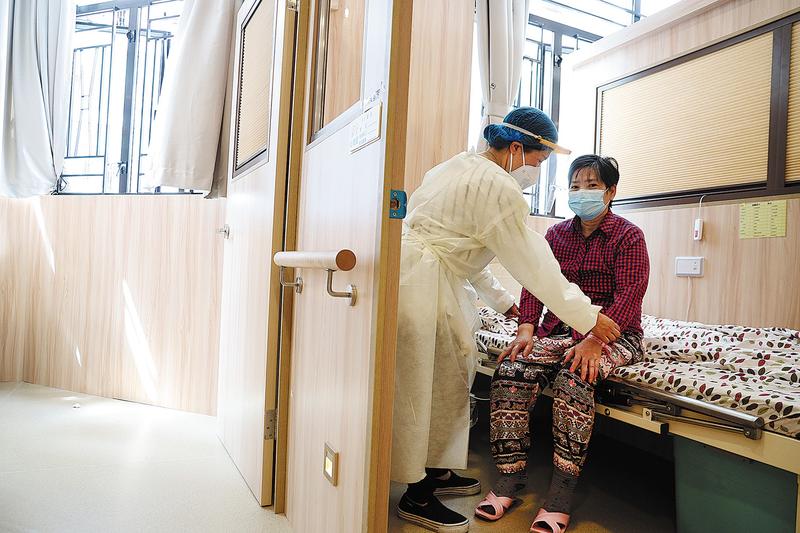 A senior is attended to at the care home. (EDMOND TANG / CHINA DAILY)
A senior is attended to at the care home. (EDMOND TANG / CHINA DAILY)
Closed-loop system
To provide another level of safety, all 15 staff members at Pleasure Lodge are subject to a closed-loop management system, which denies them contact with the outside world. A shuttle bus takes them from their hotel to work at about 6 am and returns them after 7 pm.
Six caregivers and two nurses are among the staff members, who are mostly older than 50, but barely sufficient to keep the home, which had taken in some 35 residents by March 18, running day and night.
About a week after Pleasure Lodge started to accept healthy arrivals, a caregiver tested positive for COVID-19-the first infected employee at the home. The worker promptly resigned, fearing she might infect her family members.
Wilfred Tseung Kwan-lok, the home's chief financial officer, said, "We will replenish manpower from other homes owned by our company and we are also hiring more recruits through the job market."
The Hong Kong government sought help from the central authorities in hiring 1,000 caregivers from the Chinese mainland to help address the shortage in the city. By March 25, 630 mainland caregivers had arrived in Hong Kong to work at isolation centers for the elderly.
As of March 22, the coronavirus had spread to 780, or 90 percent, of the city's residential care homes for the elderly. About half the residents at these homes were infected.
Some 8,700 workers at the homes, which are short of employees, have become infected with COVID-19, further straining the workforce.
Tseung said the company that owns Pleasure Lodge, Sing Yan Health Care Group, which has eight nursing homes in Hong Kong, plans to hire 60 to 70 recruits. Seven are expected to arrive this month after the government speeds up the recruitment of imported labor in view of the pandemic.
Of the 180 staff members employed by the company, 140 have tested positive for COVID-19, with 130 recovering and returning to work.
Fong said the occupancy rate at the eight nursing homes is about 50 percent, with some 400 senior residents living in these facilities. About 300 elderly residents in the care homes owned by the company have contracted COVID-19, with 30 dying from infection by April 6.
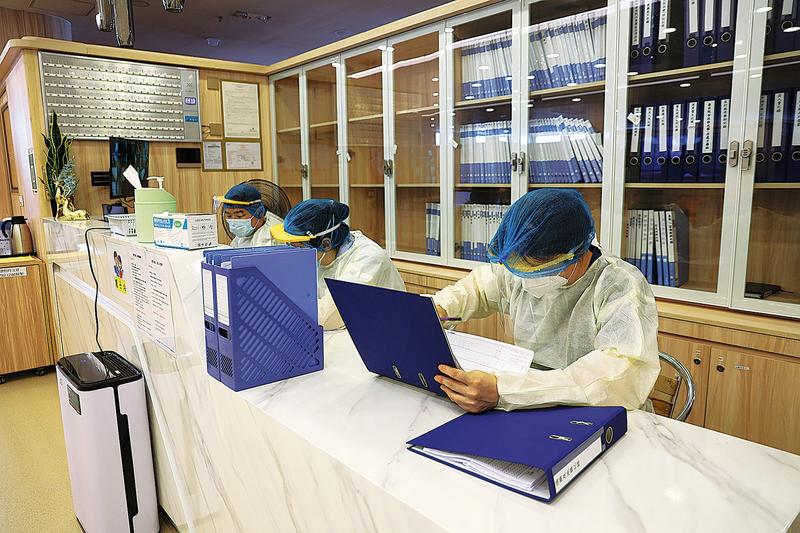 The nursing station at Pleasure Lodge. (EDMOND TANG / CHINA DAILY)
The nursing station at Pleasure Lodge. (EDMOND TANG / CHINA DAILY)
Wall of immunity
By April 2, the fifth wave of COVID-19 in Hong Kong had claimed 8,705 lives, with 96 percent of the cases being adults who were 60 or older, most of them not vaccinated. Among the deaths, about 55 percent were residents from care homes. By April 6, a total of 1.18 million people in the city had been infected during the fifth wave.
Vaccination has been effective in preventing COVID-19 patients becoming severely ill and dying.
On March 22, the Li Ka Shing Faculty of Medicine at the University of Hong Kong released results of a study into 16,000 patients hospitalized with COVID-19 in the city. The study found that three vaccinations reduced the death rate among those who are 60 or older by 98 percent.
Lam, the city's chief executive, said in her daily COVID-19 media briefing on March 27 that nearly 90 percent of the deaths recorded during the fifth wave were unvaccinated cases or concerned those who had not had two jabs. The mortality rate for these cases was 18 times higher than for those who had been vaccinated at least twice, she said.
It is vital to get vaccinated, which is the only way to prevent severe illness and deaths, and also to get out of the "pandemic quagmire", Lam said.
Boosting vaccination among the elderly and children has been high on the Hong Kong government's agenda to build up a wall of immunity against the virus.
Hong Kong Secretary for Labour and Welfare, Law Chi-kwong, said vaccinations for the elderly in the city's 1,100 nursing homes and homes for the disabled made little headway, as only 22 percent of such residents received COVID-19 jabs after six months of efforts to boost inoculation before the fifth wave hit the city.
Law said in a post on his official blog on March 27, "We need to keep on trying, bearing in mind that one more person vaccinated is one more saved."
On March 18, government teams completed administering the first vaccinations for those at nursing homes and homes for the disabled whose health was considered suitable for COVID-19 jabs. By the middle of this month, the government hopes that second jabs will have been completed for these residents, as by this time the city will begin easing social distancing in a gradual return to normal operations.
More than 43,300 residents at these homes, or 56 percent, have received COVID-19 jabs.
As of April 6, more than 6.5 million of those aged 3 and older in the city had received their first dose of a COVID-19 vaccination, with nearly 2.9 million residents being given three jabs.
The government strived to bolster the vaccination rate, aiming for more than 90 percent of residents who are 12 or older to receive at least two COVID-19 jabs by the end of last month.
In a new initiative to boost the inoculation rate among the elderly, the city's Secretary for the Civil Service, Patrick Nip Tak-kuen, who is responsible for vaccination services, said on March 28 that the government would set up a registration website to provide such services door-to-door in an attempt to contact every resident.
At the end of last month, the government also started to arrange door-to-door inoculation services for unvaccinated adults who are 70 or older, along with people with disabilities.
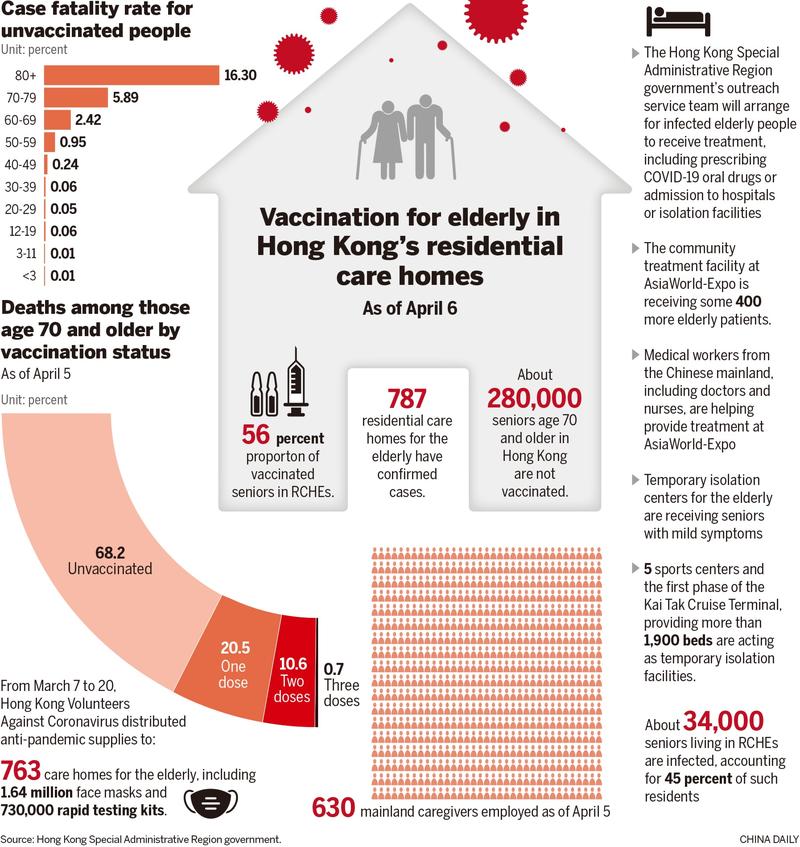
Triage system
At the suggestion of a top mainland epidemiologist visiting the city at the end of February, the Hong Kong government agreed to adopt a triage system to reduce the number of deaths and severely ill patients.
This five-level system places those most in need of medical attention in intensive care units or general medical wards at public hospitals. Those with mild symptoms are placed in community isolation and treatment facilities or in isolation centers designated for the elderly. Patients due to be admitted to these facilities first undergo home quarantine, during which they can seek medical services at the city's designated COVID-19 clinics.
In addition to the triage system, to prioritize senior patients and those who are critically ill, traditional Chinese medicine, or TCM, has been called for.
On March 29, a seven-member team of TCM experts arrived in Hong Kong from the mainland, joining 20 such practitioners from across the border who arrived earlier to treat COVID-19 patients, especially the elderly, at the Asia-World-Expo community treatment facility.
Welcoming the experts at Shenzhen Bay Port, Lam said the use of TCM, which has been highly effective on the mainland in curing COVID-19 patients, will be beneficial to Hong Kong's anti-pandemic goal of preventing people becoming critically ill and dying.
"Chinese medicine is also very effective in rehabilitation. After a COVID-19 patient has been cured, particularly an elderly patient, the use of Chinese medicine can also help with a speedy recovery," Lam said.
The use of TCM to treat COVID-19 patients has been accelerated in the city. Many infected seniors in residential care homes have received such medication, especially asymptomatic cases and those with mild symptoms.
TCM was administered to retired primary school teacher Lui Pak-yuen, 63, and his 89-year-old mother, residents at Prosperous Garden, a private nursing home in Tseung Kwan O.Both were infected with COVID-19.
The pair, who are firm believers in TCM, consulted practitioners via video calls, quickly recovering after several days of treatment.
Silver lining
The pandemic has also brought people closer. In times of crisis, many have offered a helping hand to those at risk, providing anti-pandemic equipment in the battle against the virus.
The fifth wave has caught numerous businesses, especially homes for the elderly, off guard, leaving them short of anti-pandemic items such as face masks, rapid antigen testing kits, oximeters and disinfectant.
Tseung, the Pleasure Lodge chief financial officer, said giving rapid antigen tests to every resident and staff member at nursing homes is becoming the new norm during the fifth wave.
The central and Hong Kong governments have donated thousands of anti-pandemic items to homes for the elderly, including proprietary Chinese medicines known to be effective in treating COVID-19.
However, Fong, the Pleasure Lodge CEO, said that by March 18, N95 face masks and protective gowns ordered in February had not arrived and the home only had enough such supplies for about one week. It later received a fresh batch of supplies donated by local "good Samaritans".
"Although we do not have sufficient gear to deal with the pandemic in the long term, I am confident that the situation will ease with the central government's support and help from all around," Fong added.
"We need to stand in solidarity in the face of the pandemic."


